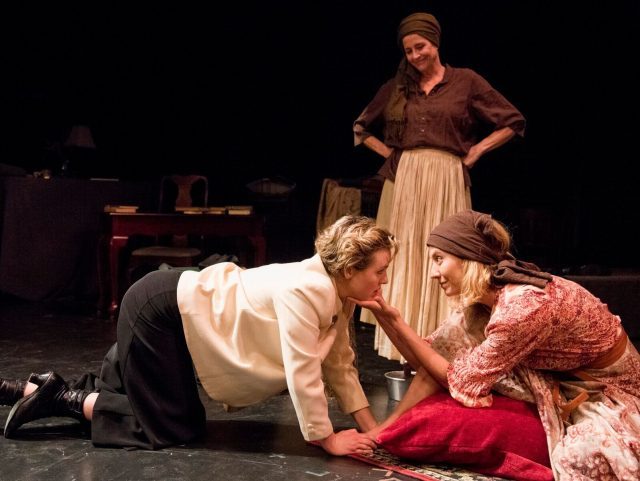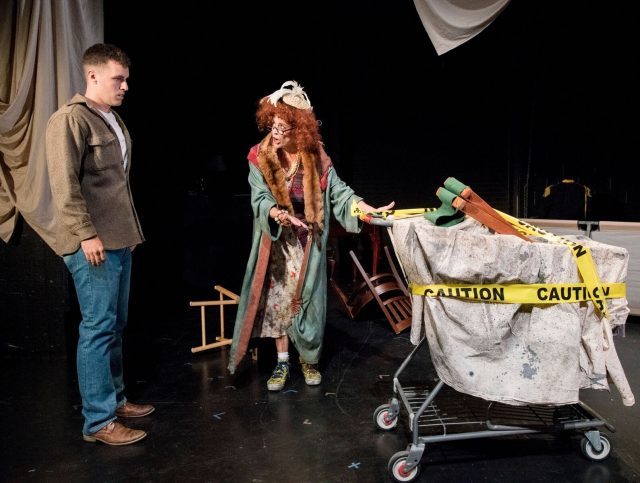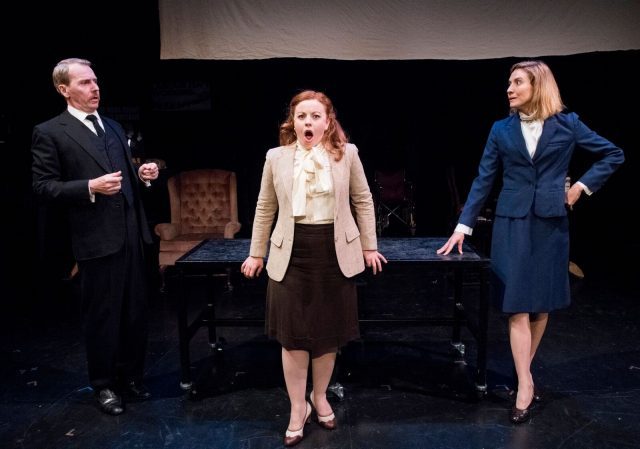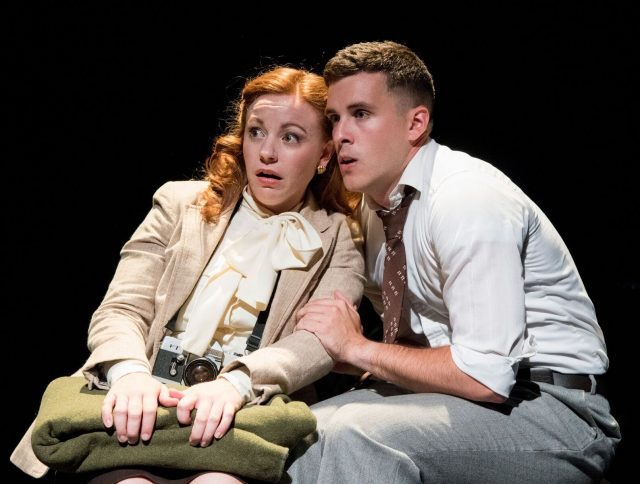
Judith (Kathleen Wise) assures a woman (Eliza Renner) that she is fine as a servant (Marianne Tatum) looks on in Howard Barker play (photo by Stan Barouh)
PTP/NYC: Potomac Theatre Project
Atlantic Stage 2
330 West 16th St. between Eighth & Ninth Aves.
Through August 5, $22.50-$37.50
ptpnyc.org
The Potomac Theatre Project (PTP) continues its long association with the work of prolific contemporary British playwrights Howard Barker and Caryl Churchill with a fast-paced evening of unique tales continuing at Atlantic Stage 2 through August 5. First up are four parts of Barker’s 1986 decalogue, The Possibilities, prime examples of his self-described “Theatre of Catastrophe.” The quartet, set in different time periods in an almost alternate reality, explores the power and morality of the state and the state’s control of its citizenry. In The Unforeseen Consequences of a Patriotic Act, a well-dressed woman (Eliza Renner) wants Judith (Kathleen Wise) to return to the city and take a victory lap a year after cutting off the head of Holofernes and several months after giving birth to their child. In Reasons for the Fall of Emperors, Alexander of Russia (Jonathan Tindle) shudders at the cries of his soldiers being tortured and killed outside as he prepares for bed. After dismissing his loyal officer (Adam Milano), he engages in a complex conversation with a wise peasant (Christopher Marshall) who is shining his boots. “Do you not love the Emperor?” Alexander asks. “It is impossible not to love him!” the peasant responds, rather unconvincingly.

An old lady (Marianne Tatum) isn’t sure she wants to sell a book to a man (Adam Milano) in Only Some Can Take the Strain (photo by Stan Barouh)
In Only Some Can Take the Strain, a government functionary (Renner) tells a bedraggled homeless woman (Marianne Tatum) that she cannot sell books out of a grocery cart; meanwhile a man (Milano) lurks about, desperate to buy an important volume. “Our arteries are clogged with anxiety, our lungs are corroded with fumes,” the lady says. “What a conspiracy and nobody knows but me.” And in She Sees the Argument But, a female official (Wise) attempts to shame a young woman (Madeleine Russell) for wearing high heels and a dress that exposes her ankles. “I don’t ask you to admire my legs,” the confident woman says. “The party executives do that.” PTP co-artistic director Richard Romagnoli adds excerpts from three Barker poems, “Don’t Exaggerate,” “Plevna,” and “Refuse to Dance,” to link the four short plays, which are performed on Hallie Zieselman’s purposely cluttered set, the props for each section waiting in the back to be brought forward when it’s their turn.

Selby (Tara Giordano) wants to save the world, confusing Mr. Price (Jonathan Tindle) and her direct superior, Dent (Kathleen Wise) (photo by Stan Barouh)
After intermission, the company digs into Churchill’s 1978 television play, The After-Dinner Joke, which consists of sixty-six scenes whirling by in an hour. “I admired two extremes on TV, extreme naturalism and extreme non-naturalism — I went for the second,” Churchill wrote about the piece, and that’s just how PTP co-artistic director Cheryl Faraone lets it unfold on Zieselman’s ever-changing, low-budget set. A large roster of characters take on the politics of charity and the charity of politics, as well as big business and religion, centered by the story of a bright, ambitious woman named Selby (Tara Giordano) who has decided to resign from her job as a personal secretary to a sales manager at a bedding store because she is not helping society. The owner, Mr. Price (Tindle), a tycoon who also has launderettes, Chinese restaurants, and factories, tells Selby, “I give employment. I provide services. I pay taxes. I make profits,” to which Selby replies, “Children are dying, sir.” Price asks, “Are you a Christian?” to which Selby answers, “Not anymore. But I feel just as guilty as if I was. And so should you.” Price opts to keep Selby on as a campaign organizer for his five charities, and off she goes, meeting a wide variety of people as she seeks to rid the world of poverty and starvation.

Selby (Tara Giordano) can’t believe what she sees in revival of Caryl Churchill play (photo by Stan Barouh)
She encounters a snake-obsessed mayor (Marshall) who tells her, “A charity is by definition nonpolitical. Politics is by definition uncharitable”; a trio of councilors who are getting hit with pies in the face to raise money; a mysterious thief (Christo Grabowski) in black who keeps popping up and stealing things; a rock star (Grabowski) who has found Jesus (and ten-year-olds); a recipe-loving local celebrity (Lucy Van Atta); a snooty country clubber (Milano) who wants to give charity only to himself; an oil sheik who considers buying Marks and Spencer; and a mother (Russell) who is forcing her son (Noah Liebmiller) to go on a fundraising walk. “If they want to give money, I don’t see why they can’t just give it,” the boy says. “I don’t see why I have to walk round and round the park all afternoon.” Some of the scenes are previously filmed and projected on a screen, which allows quick set changes to be made while channeling a little bit of Monty Pythonesque humor. The play, which is set in the 1970s, takes on added relevance just as the Institute of Economic Affairs in England is being investigated for possible abuse of the necessary separation between charity and politics. “Charity Commission rules state that ‘an organization will not be charitable if its purposes are political.’ How much more political can you get?” George Monbiot writes in the Guardian after exposing several questionable connections. Now in its thirty-second season, PTP, which in 2015 at Atlantic Stage 2 presented Barker’s Scenes from an Execution and Churchill’s Vinegar Tom in repertory, prefers to stage productions of challenging, unconventional, experimental plays, and they have come up with a pair of fine choices yet again.